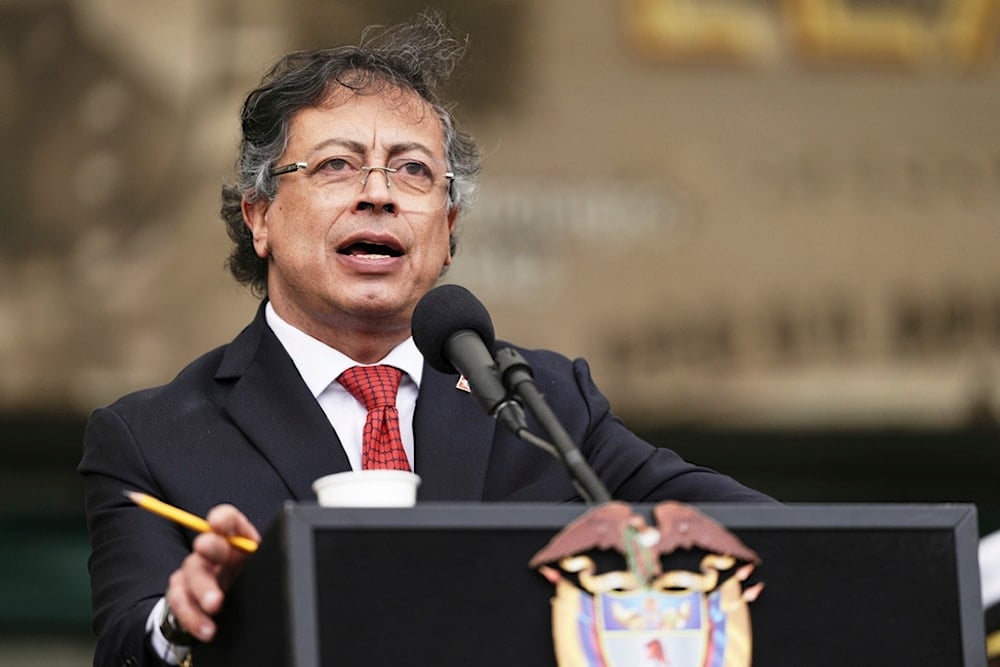'Condemn Israel or be complicit in genocide': Colombia's Gustavo Petro
Colombian President Gustavo Petro, in a Guardian op-ed, accuses Netanyahu of genocide in Gaza and urges global action.
-

Colombia's President Gustavo Petro speaks during a military ceremony in Bogota, Colombia, on June 6, 2025. (AP Photo/Ivan Valencia)
On Tuesday, The Guardian published an opinion piece by Colombian President Gustavo Petro, in which he accused Israeli Prime Minister Benjamin Netanyahu of orchestrating a "campaign of devastation" in Gaza and called on the international community to move beyond symbolic outrage toward concrete action in defense of international law.
Petro has emerged as one of the most outspoken world leaders condemning "Israel’s" war on Gaza, and his latest opinion piece adds to a growing series of forceful critiques directed at the ongoing Israeli genocide.
Denouncing what he described as 600 days of systematic atrocities, Petro wrote that the world's inaction risks legitimizing a model of impunity where colonial violence, ethnic cleansing, and siege warfare are normalized against a captive population.
"If we fail to act now," he wrote, "we not only betray the Palestinian people, we become complicit in the atrocities committed by Netanyahu's government."
Moral break
The president highlighted a landmark United Nations General Assembly resolution adopted in September 2024, which called for "Israel" to end its illegal occupation within 12 months. He noted that Colombia was among the 124 countries that voted in favor, thereby assuming binding obligations that include sanctions, legal action, and trade measures.
"The clock is now ticking," he warned, reaffirming Colombia's commitment by recalling its concrete step: suspending coal exports to "Israel."
In his piece, Petro mentioned that he had declared earlier this year: "We cannot fuel the machinery that slaughters Palestinian children and then claim neutrality."
This is not the first bold move by the Colombian president. In May, his government formally cut diplomatic ties with "Israel," citing what Petro explicitly described as a "genocide." His administration also appointed Colombia’s first ambassador to Palestine, pledging medical treatment in Colombian hospitals for injured children from Gaza. The newly appointed ambassador, Jorge Iván Ospina, later echoed Petro’s position, warning of a "macabre intention to erase the identity of a people."
In Tuesday's article, Petro praised similar actions taken by countries like Malaysia, which banned Israeli ships from its ports, and South Africa, which brought "Israel" before the International Court of Justice (ICJ) on charges of genocide. It is worth noting that Colombia joined that case as an intervening party, further deepening its legal opposition to "Israel's" war.
Read more: US defends Israeli use of starvation as weapon of war before ICJ
Global reckoning
Looking ahead, Petro mentioned that Colombia and South Africa, co-chairs of the Hague Group, will host an emergency summit regarding Gaza on July 15.
The conference aims to develop a coordinated, multilateral strategy to isolate "Israel" diplomatically and economically while restoring credibility to the global legal order. With the UN's proposed international peace conference indefinitely postponed, Petro cast the July summit as a necessary corrective to global paralysis.
The Colombian president framed the Gaza crisis not just as a moral catastrophe but as an existential test for international law and nations of the Global South.
"We can either stand firm in defense of the legal principles that seek to prevent war and conflict," he wrote, "or watch helplessly as the international system collapses under the weight of unchecked power politics."
He concluded his piece by stressing that the choice is between complicity in colonial violence and collective resistance against it.

 4 Min Read
4 Min Read










